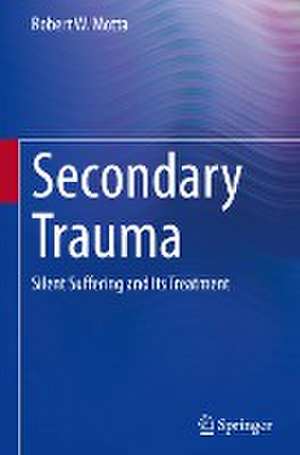Secondary Trauma: Silent Suffering and Its Treatment
Autor Robert W. Mottaen Limba Engleză Hardback – 19 oct 2023
Preț: 782.57 lei
Preț vechi: 954.35 lei
-18% Nou
Puncte Express: 1174
Preț estimativ în valută:
149.74€ • 156.36$ • 123.65£
149.74€ • 156.36$ • 123.65£
Carte tipărită la comandă
Livrare economică 15-29 aprilie
Preluare comenzi: 021 569.72.76
Specificații
ISBN-13: 9783031443077
ISBN-10: 3031443071
Pagini: 175
Ilustrații: XXII, 175 p.
Dimensiuni: 155 x 235 mm
Greutate: 0.46 kg
Ediția:1st ed. 2023
Editura: Springer Nature Switzerland
Colecția Springer
Locul publicării:Cham, Switzerland
ISBN-10: 3031443071
Pagini: 175
Ilustrații: XXII, 175 p.
Dimensiuni: 155 x 235 mm
Greutate: 0.46 kg
Ediția:1st ed. 2023
Editura: Springer Nature Switzerland
Colecția Springer
Locul publicării:Cham, Switzerland
Cuprins
Introduction
Chapter
I. Origins
Chapter
II. Childhood Secondary Trauma:
Chapter
III. Adult Family Caregivers.
Chapter
IV. Secondary Trauma in Professional Caregivers
Chapter
V. Secondary Trauma in First Responders and Those Not Providing Professional
Care.
Chapter
VI. Secondary Trauma Treatment Considerations
Chapter
VII. Structural Interventions
Chapter
VIII. Social Support and Secondary Trauma
Chapter
IX . Exercise and Secondary Trauma
Chapter
X . Mindfulness Meditation and Secondary Trauma
Chapter
XI . Yoga and Secondary Trauma
Chapter
XII . The Impact of Animals on Secondary Trauma.
Chapter
XIII . Self-Care and Natural Environment Interventions
Chapter
XIV . Key Takeaways
Chapter
I. Origins
Chapter
II. Childhood Secondary Trauma:
Chapter
III. Adult Family Caregivers.
Chapter
IV. Secondary Trauma in Professional Caregivers
Chapter
V. Secondary Trauma in First Responders and Those Not Providing Professional
Care.
Chapter
VI. Secondary Trauma Treatment Considerations
Chapter
VII. Structural Interventions
Chapter
VIII. Social Support and Secondary Trauma
Chapter
IX . Exercise and Secondary Trauma
Chapter
X . Mindfulness Meditation and Secondary Trauma
Chapter
XI . Yoga and Secondary Trauma
Chapter
XII . The Impact of Animals on Secondary Trauma.
Chapter
XIII . Self-Care and Natural Environment Interventions
Chapter
XIV . Key Takeaways
Notă biografică
Robert W. Motta, Ph.D., ABPP is a Professor Emeritus of Psychology and founder of the Child and Family Trauma Institute at Hofstra University, New York. There he served as chairperson of the Psychology department and founded an American Psychological Association accredited PsyD psychology doctoral program. He has published more than 100 scientific papers and book chapters as well as four books, including Alternative Therapies for PTSD: The Science of Mind-Body Treatments, published by the American Psychological Association.
Dr. Motta is board certified in cognitive-behavioral psychology and behavior therapy. He is the former president of the School Division of the New York Psychological Association, is a licensed clinical psychologist and certified school psychologist.
Dr. Motta is board certified in cognitive-behavioral psychology and behavior therapy. He is the former president of the School Division of the New York Psychological Association, is a licensed clinical psychologist and certified school psychologist.
Textul de pe ultima copertă
This book focuses on secondary trauma as distinct from other forms of psychological trauma and PTSD. While PTSD has garnered considerable attention in the literature, secondary trauma afflicts a far greater number of people. Secondary trauma refers to the spread of negative emotional and cognitive states from those who are traumatized to those who have close contact with these individuals. While PTSD and other forms of primary trauma can negatively alter one’s self-perception and result in a fearful distrust of one’s environment, secondary trauma taxes and drains one emotionally but often does not cause a weary distrust of the environment and negative self-view. The book delineates how, when, and where secondary trauma occurs and provides the latest information on treatments. it is noted that unlike primary trauma and PTSD which respond to traditional treatments such as cognitive-behavioral therapy and exposure therapy, secondary traumatization is best addressed with interventions such as targeted social support, various exercise interventions, mindfulness, yoga, animal assisted therapy, and immersion in natural environments. Secondary trauma is a common and commonly ignored stressor whose impact is wide ranging. This volume accessibly brings this problem to the fore and is a resource for all of those who deal with "silent sufferers" and paves the way for further, necessary study.
Caracteristici
Examines the scope and impact of this kind of trauma
Focuses specifically on secondary trauma
Provides guidelines for mental health professionals
Focuses specifically on secondary trauma
Provides guidelines for mental health professionals
